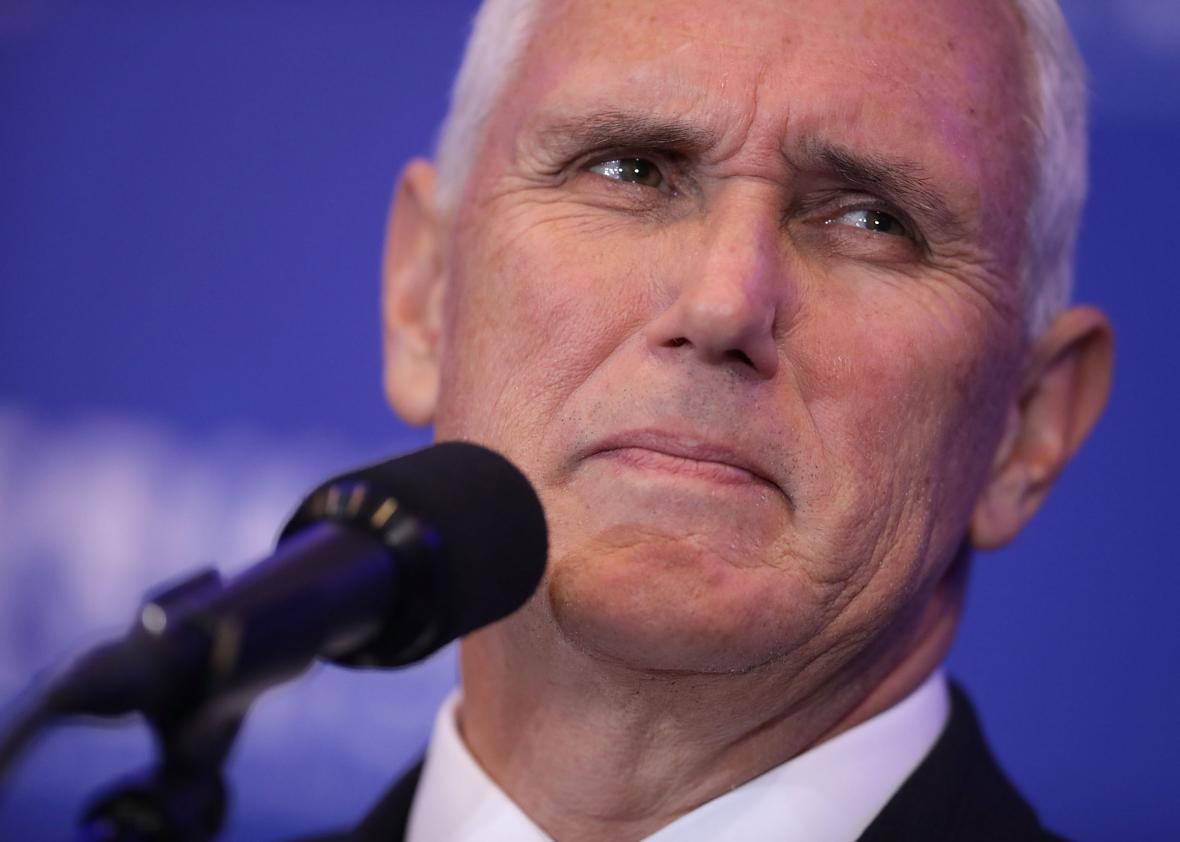On Friday night, Vice President-Elect Mike Pence attended a performance of Hamilton and was loudly booed by the audience. A fitting reception, you might think, for a man who has devoted much of his political career to harming LGBTQ people? Not at all, said Maggie Haberman and David Itzkoff of the New York Times. Haberman, who covered the presidential campaign, suggested that booing showed an unacceptable “level of disrespect”; Itzkoff, a culture writer, tweeted that the crowd’s reaction “bums me out. Whatever you think of him. He’s trying to engage.”
At Deadspin, Ashley Feinberg has a simple, bracing rejoinder to this hand-wringing: Pence is a viciously anti-gay politician who supports ex-gay conversion “therapy,” opposes LGBTQ rights across the board, and signed sadistic anti-abortion laws. “Mike Pence,” Feinberg concludes, “deserves every single bit of disrespect thrown at him, and to be booed absolutely everywhere he goes.”
Feinberg is correct, of course, and it is obnoxious for two straight journalists—who will likely never be demeaned by Pence’s odious policies—to lecture us about civility toward Pence. (Itzkoff, at least, ended up apologizing, tweeting, “I hope I do better next time.”) But there is another, more specific reason why Pence deserved to be booed in this particular time and place. AIDS hit Broadway hard; the Reagan administration’s cruel negligence toward the crisis resulted in the deaths of some of Broadway’s brightest lights in the 1980s. Eventually, Presidents George H.W. Bush and Bill Clinton took action to stop the spread of AIDS and save the lives of HIV-positive people.
But when Pence ran for Congress in 2000, he ran on a platform of reversing these life-saving advances. As his “Guide to Renewing the American Dream” explained, Pence had serious concerns about the Ryan White CARE Act, a vital federal program that helped provide medication and treatment to low-income and uninsured AIDS patients. “Congress,” Pence wrote, “should support the reauthorization of the Ryan White Care Act only after completion of an audit to ensure that federal dollars [are] no longer being given to organizations that celebrate and encourage the types of behaviors that facilitate the spreading of the HIV virus.”
Pence, in other words, insisted that no federal funds should go to AIDS organizations that accept homosexuality. Instead, he argued: “Resources should be directed toward those institutions which provide assistance to those seeking to change their sexual behavior.” Put simply, Pence wanted to redirect critical HIV funding from AIDS treatment programs to ex-gay conversion therapy—i.e., torture.
Obviously, Pence never achieved his goal of diverting federal AIDS funding to conversion therapy programs. But if he had, thousands of AIDS patients would have undoubtedly died for no good reason. Pence’s policy—which he has never repudiated, despite opportunities to do so—suggested that low-income people should only receive AIDS medication if they renounce their homosexuality and attempt “to change their sexual behavior.” Moreover, treatment centers and programs that fight AIDS should only get federal funds if they condemn homosexuality. These toxic ideas, if enacted, would have shuttered countless clinics and deprived innumerable patients of the drugs they needed to survive.
Broadway, always a haven for LGBTQ creative talents, struggled to survive the AIDS crisis. “It’s hard for anyone,” Aaron Grunfeld has written, “except maybe a wartime soldier, to comprehend how quickly and savagely AIDS struck the theatre community in the 1980s.” But the industry emerged with an activist streak. The theater union launched Equity Fights AIDS in 1987, and producers responded with Broadway Cares in 1988; the nonprofits, which merged in 1993, provided HIV-positive people with health care, legal advice, emotional support, and palliative care. Broadway Cares/Equity Fights AIDS still exists today—indeed, just after the Hamilton cast delivered a message to Pence urging him to “uphold our American values,” it asked theatergoers to support the organization.
In response to Friday night’s booing, Donald Trump tweeted Saturday morning that the theater should be a “safe and special place” for everyone. That’s not quite right. If the theater is a safe space for anybody, it’s for those who support the battle against AIDS and the struggle for LGBTQ equality. Modern theater was built upon those principles; Mike Pence vigorously opposes them. Audience members at Hamilton may not have considered all this history when they booed Pence. But they were only giving him what he deserved: a reminder that, if Pence had had his way, many of the luminaries who created the play—including its current star, an HIV-positive gay man—would not be alive today.
